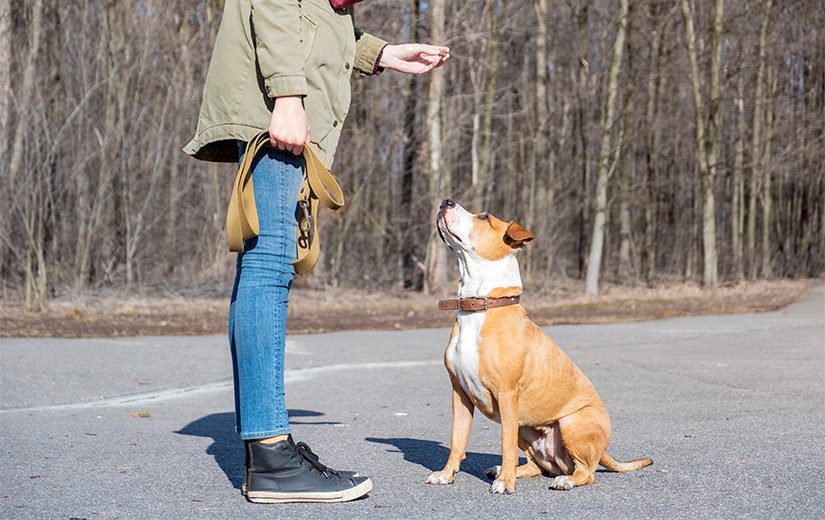Choosing the right dog trainer is one of the most important decisions you can make for your dog’s welfare. But with so many options available, it can be difficult to know if a training style supports your pet’s best welfare.
The BC SPCA warns against any type of training that uses fear, pain or intimidation to control an animal’s behaviour. Such aversive methods can include the use of shock or prong collars, or other equipment associated with poor welfare for your dog and undesirable behavioural outcomes.
But some trainers who include these aversive methods use softer-sounding terms to describe their methods, which can lead to confusion for dog guardians.
One example is ‘balanced’ dog training, which takes advantage of the positive connotation of the word. Even though ‘achieving balance’ is associated with success in our own lives, that meaning doesn’t hold true in dog training. Balanced training doesn’t equal success and doesn’t help our dogs.

What is balanced dog training?
The term balanced training is used to describe dog training methods that use both rewards and aversive methods such as physical punishment. This means that along with praise and food treats, a balanced dog trainer will also use tools and methods that cause pain and fear in dogs, like prong and shock collars, and jerking on the leash or collar.
The term ‘balanced’ can be an effective but misleading marketing tool. Some balanced trainers may just not be aware of the negative outcomes of aversive training while other appeal to dog guardians by explaining that they offer a middle ground, moderate approach to training. They will say that they need to be able to use “every tool in the toolbox” and that there is more than one way to train dogs. However, science tells us that a reward-based approach to training is effective and protects your bond with your dog, so there simply isn’t a reason to include physical punishment in any training plan.
What can happen when “corrective tools” are used?
The term “corrective tools” may sound innocuous, but it ignores science and the link between punishment-based training and poor dog welfare and long-term behavioural consequences. Balanced trainers might encourage the use of rewards and play, but they also deliver “corrections” to change behaviour through tools and methods that use fear and pain to motivate behaviour change.
Carol Millman, owner and trainer at AnimalKind accredited Wag the Dog, highlights where balanced training falls short. Millman says, “A multitude of studies, meta-studies, and literature reviews have concluded that the use of aversive tools such as slip collars, prong collars, and shock collars are associated with higher cortisol levels in dogs, higher rates of stress behaviours, and increased incidence of aggressive behaviour.”
Millman summarizes the problem in two phrases, “Balanced training is a misnomer. Science says balanced training leads to unbalanced dogs.”
A better approach is the one used by trainers who only use reward-based methods. The focus is on redirecting the behaviour instead of punishing the dog. The idea is to show your dog what to do and encourage them to do it using rewards like treats, attention and toys. These trainers set up dogs for success and reward the desired behaviours.
It’s not just kinder – studies show reward-based training is actually more effective than aversive training.

Are aversive methods ever necessary?
Proponents of balanced training argue that sometimes aversive methods are necessary. However, there is no evidence that dogs of certain breeds respond better to punishment-based training methods. Additionally, aversive methods are not more successful in treating certain behaviour problems such as aggressive behaviours (compared to a rewards-based approach).
Instead of resorting to aversive methods, humane, science-based dog trainers respond to each dog’s individuality by figuring out which rewards strongly motivate the dog, what they are fearful of, and learning about the dog’s own unique history. For example, some are food-driven, some value attention and playtime. Some are reactive to other dogs; some are better at walking on a leash. With this knowledge a skilled trainer can craft a unique training plan that makes training fun and enjoyable for the dog, and helps them learn.
Will my dog listen to me without the treats?
To justify using punitive methods, some trainers may try to convince you that when the rewards and treats are gone, so is the training.
They rely on the incorrect assumption that positive reinforcement only works as long as treats are available. Millman explains, “Some trainers assume that the dog will not choose them if given a free choice. They assume their dog would rather be elsewhere unless they bribe them with treats or compel them with pressure or pain.”
In contrast, trainers who are up-to-date on the science understand the power of training lies in building a trusting relationship with your dog. Millman adds, “The balanced training approach doesn’t take into account the joy that comes with knowing that your dog chooses to race toward you, not because they have to, not because they fear the consequences, but because they want to be with you and please you.”

Say no to ‘balanced’ dog training
Some balanced trainers talk about how effective punishment-based methods are and use this argument by promising quick results. This is incorrect.
Dog training requires patience, repetition, and consistency. It takes a highly skilled and knowledgeable trainer to implement a responsible and effective science-based training plan that puts dogs first and does not resort to punishment for easy results.
Studies show that reward-based training is just as effective as punishment-based training. So as a dog guardian who loves and deeply cares for your dog, why choose a training method that damages the human-animal bond when an effective, science-based effective training method is available?
Learn the differences between balanced training and reward-based training with this easy-to-understand infographic we have on the AnimalKind site.
Avoid the harms of balanced training and instead choose a humane dog trainer who will help you reinforce the positive, trusting bond you and your dog share.
Useful resources:
Ready to find a dog trainer? Find a BC SPCA recommended AnimalKind trainer!
Want to learn more about how to choose a dog trainer? Head to how to find a skilled dog trainer.
Curious about what humane training is? Learn to recognize the 5 elements of humane training.
New dog guardian? We’ve got you covered! A step-by-step guide for new dog guardians.
Stay informed!
Subscribe to AnimalKind and stay up-to-date with the latest news on dog training.

The BC SPCA uses your personal information to update you on our work for animals as well as for advertising and analytics purposes. More information on uses and how to opt-out can be found in our Privacy Policy.
